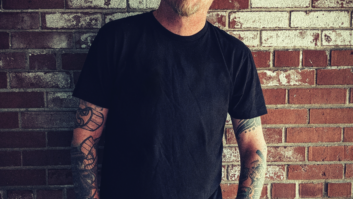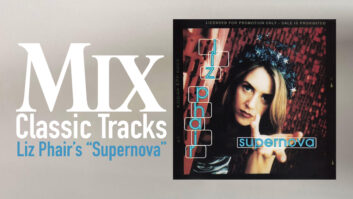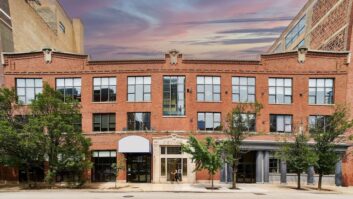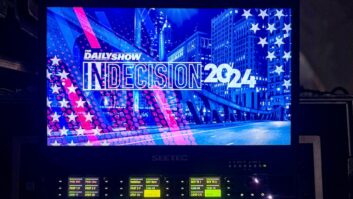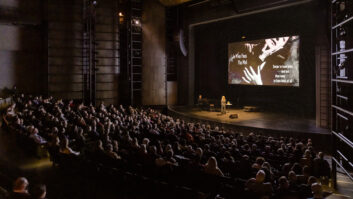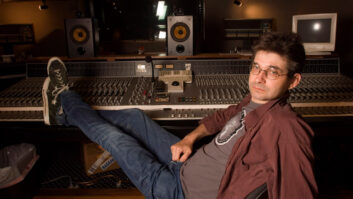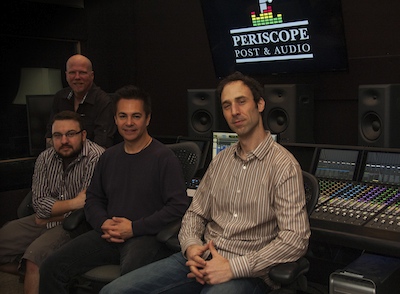
On August 26, 2013, producer and post supervisor Michael Nehs, along with business partner Jonathon Bross, opened the doors to Periscope Post & Audio, a then 2,000-square-foot post house in the sprawling 50-acre campus of Cinespace Chicago, located in a converted steel plant five miles outside of the downtown. That same day, Nehs started work on two TV shows.
“I was still waiting for gear to come in,” Nehs says, “so I went to GC Pro and built an ADR rig right off the shelf just for the first two days of ADR.”
That first setup included a Mac Pro, Avid Pro Tools 11, Apogee Duet, JBL monitors, Sennheiser MKH-60 shotgun mic and a Shure lavalier. “The gear chain hasn’t changed drastically from that,” Nehs says, “but it’s definitely more beefed up.”
Nehs and Bross had the vision to start a full-service audio/video post-production facility in Chicago to go after the producers who would film in Chicago and then head to New York or L.A. for post. Nehs knew there was world-class post in Chicago, but most shops offered only certain segments, while the proposal for Periscope would handle everything, what Nehs has called “from dailies to delivery all under one roof.”
So when Cinespace Chicago, a complex with over 1 million square feet of shooting stages, started looking at business plans to bring audio and post-production onto its campus, Periscope stood out for its holistic strategy. The space had to be completely renovated, but Nehs says he was getting calls from networks as soon as Cinespace chose them. The Cinespace affiliation has helped in securing jobs for clients like Fox, ABC, USA and other networks, and within 10 months of opening, Nehs already decided that it was time to grow.
Periscope will finish its expansions in July and will cover about 7,000 square feet of recording studios, control rooms, editing suites, color suites, a Foley room, a Dolby dubbing stage and more with designs by Kevin Rodgers of Karp Designs. Just about every space monitors through JBLs, including LSR305s in Nehs’ editorial space and in the main room, LSR4326Ps for the two rear surround-sound satellites and LSR4328Ps for the three front mains.
“I’m in love with the JBLs,” Nehs says. “Part of the reason is the sound quality, and it’s really easy to tune a room with them. You just can’t beat them for the money.”
Periscope also uses John Hardy preamps throughout the facility. Their common vocal recording chain starts with a Neumann U 47 through an LA-2A to a John Hardy preamp and recorded with Pro Tools 11 HDX with Avid Xmon hardware and mixed on an Avid System 5-MC console.
With the expansion complete, Nehs says Periscope could handle working on 10 projects simultaneously with its 10 regular employees plus freelancers and outside talent. When Mix spoke to him, Periscope was working on The Blexicans sitcom pilot, full post for two independent features, dailies for a horror film by WWE Studios and was about to dedicate a whole space to season two of Fox’s Empire.
Periscope had recorded more than 30 songs for Empire season one and also handled ADR. For the second season debuting this fall, Fox bumped it up from 12 to 18 episodes and doubled the amount of music. “They’re going to need roughly 72 approved songs,” Nehs says, “which means we’ll record more than 100 tracks for them, all original.”
For such a huge job, the show will bring in its own music producers, such as season one producer Jim Beanz, who will write the songs and get them pre-approved from the network. They’ll then go to Chicago with the actors from the show for recording. “We take those tracks, ship them the same day for approval, and if they get approved, we go back into final mix,” Nehs says. “Then we deliver it back to them with their stems, usually the next day. We’ve done turnarounds in as fast as 12 hours on original songs.”
Even though Periscope is humming along consistently on some high-profile projects, Nehs says the biggest challenge is still getting the word out that Periscope has world-class, A-Z post-production in Chicago. “All my rooms are based off of rooms I’ve been in at different studios in L.A. I’m taking proven designs and replicating them here.”
Periscope can entice some clients to stay in Chicago for post with its unique tax-assistance program, where they help clients maximize and navigate the 30-percent Illinois tax credit for producers working in the state and hiring local crews and talent. “We love to do it from start to finish,” Nehs says. “We can save them time and money if we talk to them before they even start filming and put together a proper workflow.
“We’re still young and growing,” he continues. “If we need to expand larger down the road, I can carve out another 2,000, 5,000, 10,000 square feet—whatever I need.”
